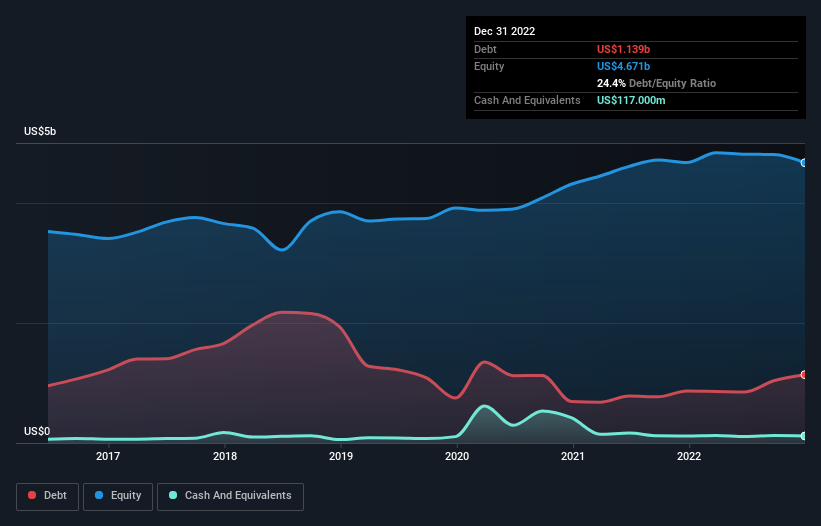- United States
- /
- Healthcare Services
- /
- NasdaqGS:HSIC
Here's Why Henry Schein (NASDAQ:HSIC) Can Manage Its Debt Responsibly

Some say volatility, rather than debt, is the best way to think about risk as an investor, but Warren Buffett famously said that 'Volatility is far from synonymous with risk.' So it might be obvious that you need to consider debt, when you think about how risky any given stock is, because too much debt can sink a company. We note that Henry Schein, Inc. (NASDAQ:HSIC) does have debt on its balance sheet. But the real question is whether this debt is making the company risky.
What Risk Does Debt Bring?
Generally speaking, debt only becomes a real problem when a company can't easily pay it off, either by raising capital or with its own cash flow. Ultimately, if the company can't fulfill its legal obligations to repay debt, shareholders could walk away with nothing. However, a more frequent (but still costly) occurrence is where a company must issue shares at bargain-basement prices, permanently diluting shareholders, just to shore up its balance sheet. Having said that, the most common situation is where a company manages its debt reasonably well - and to its own advantage. When we examine debt levels, we first consider both cash and debt levels, together.
See our latest analysis for Henry Schein
What Is Henry Schein's Net Debt?
As you can see below, at the end of December 2022, Henry Schein had US$1.14b of debt, up from US$866.0m a year ago. Click the image for more detail. However, it does have US$117.0m in cash offsetting this, leading to net debt of about US$1.02b.

How Healthy Is Henry Schein's Balance Sheet?
Zooming in on the latest balance sheet data, we can see that Henry Schein had liabilities of US$2.22b due within 12 months and liabilities of US$1.71b due beyond that. Offsetting this, it had US$117.0m in cash and US$1.44b in receivables that were due within 12 months. So its liabilities total US$2.38b more than the combination of its cash and short-term receivables.
While this might seem like a lot, it is not so bad since Henry Schein has a huge market capitalization of US$11.1b, and so it could probably strengthen its balance sheet by raising capital if it needed to. But it's clear that we should definitely closely examine whether it can manage its debt without dilution.
We use two main ratios to inform us about debt levels relative to earnings. The first is net debt divided by earnings before interest, tax, depreciation, and amortization (EBITDA), while the second is how many times its earnings before interest and tax (EBIT) covers its interest expense (or its interest cover, for short). The advantage of this approach is that we take into account both the absolute quantum of debt (with net debt to EBITDA) and the actual interest expenses associated with that debt (with its interest cover ratio).
Henry Schein's net debt is only 0.94 times its EBITDA. And its EBIT covers its interest expense a whopping 32.5 times over. So you could argue it is no more threatened by its debt than an elephant is by a mouse. The good news is that Henry Schein has increased its EBIT by 2.1% over twelve months, which should ease any concerns about debt repayment. There's no doubt that we learn most about debt from the balance sheet. But ultimately the future profitability of the business will decide if Henry Schein can strengthen its balance sheet over time. So if you're focused on the future you can check out this free report showing analyst profit forecasts.
Finally, while the tax-man may adore accounting profits, lenders only accept cold hard cash. So it's worth checking how much of that EBIT is backed by free cash flow. Over the most recent three years, Henry Schein recorded free cash flow worth 73% of its EBIT, which is around normal, given free cash flow excludes interest and tax. This cold hard cash means it can reduce its debt when it wants to.
Our View
Henry Schein's interest cover suggests it can handle its debt as easily as Cristiano Ronaldo could score a goal against an under 14's goalkeeper. And that's just the beginning of the good news since its conversion of EBIT to free cash flow is also very heartening. It's also worth noting that Henry Schein is in the Healthcare industry, which is often considered to be quite defensive. Zooming out, Henry Schein seems to use debt quite reasonably; and that gets the nod from us. While debt does bring risk, when used wisely it can also bring a higher return on equity. The balance sheet is clearly the area to focus on when you are analysing debt. However, not all investment risk resides within the balance sheet - far from it. To that end, you should be aware of the 1 warning sign we've spotted with Henry Schein .
When all is said and done, sometimes its easier to focus on companies that don't even need debt. Readers can access a list of growth stocks with zero net debt 100% free, right now.
Valuation is complex, but we're here to simplify it.
Discover if Henry Schein might be undervalued or overvalued with our detailed analysis, featuring fair value estimates, potential risks, dividends, insider trades, and its financial condition.
Access Free AnalysisHave feedback on this article? Concerned about the content? Get in touch with us directly. Alternatively, email editorial-team (at) simplywallst.com.
This article by Simply Wall St is general in nature. We provide commentary based on historical data and analyst forecasts only using an unbiased methodology and our articles are not intended to be financial advice. It does not constitute a recommendation to buy or sell any stock, and does not take account of your objectives, or your financial situation. We aim to bring you long-term focused analysis driven by fundamental data. Note that our analysis may not factor in the latest price-sensitive company announcements or qualitative material. Simply Wall St has no position in any stocks mentioned.
About NasdaqGS:HSIC
Henry Schein
Provides health care products and services to office-based dental and medical practitioners, and alternate sites of care worldwide.
Good value with adequate balance sheet.
Similar Companies
Market Insights
Community Narratives



